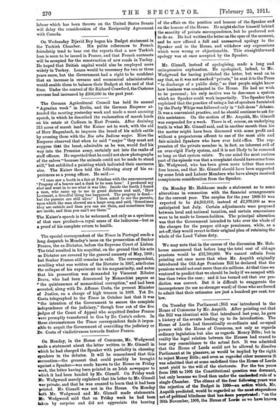The German Agricultural Council has held its annual "Agrarian week"
in Berlin, and the German Emperor at- tended the meeting yesterday week and made a most amusing speech, in which he described the reclamation of marsh lands on his estate at Cadinen in East Prussia. After draining 315 acres of marsh land the Kaiser set to work, with the aid
of Herr Hagenbeck, to improve the breed of his milch cattle by crossing them with the Bos zebu Indices major. Here the Emperor observed that when he said " major" they must not
suppose that the beast, admirable as he was, would find his way into the Prussian army, certainly not into the ranks of staff officers. He regretted that he could not show photographs of the calves "because the animals could not be made to stand still," but exhibited a painting which indicated their enormous size. The Kaiser then told the following story of his ex- periences as a young officer. He said
"I once saw a booth in a fair at Potsdam with the announcement ' Progeny of a beaver and a duck to be seen here.' I produced my obol and went in to see what it was like. Inside the booth I found a man, who came up to me in great distress and said, 'Herr Leutnant, a dreadful thing has happened. The progeny is dead— but the parents are still alive.' I then asked to see the parents, upon which the man showed me a large coop, and said, 'Sometimes they are outside and then you can see them, and sometimes they are inside, and then you can't see them.'"
The Kaiser's speech is to be welcomed, not only as a specimen of that rare product--a royal sense of the ludicrous—but as a proof of his complete return to health.






































 Previous page
Previous page